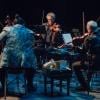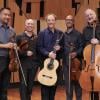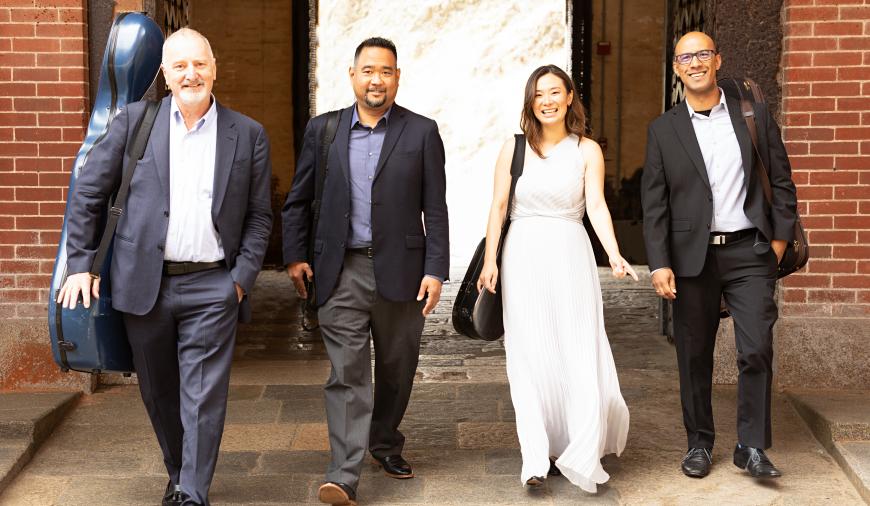
String quartets are like human beings: mortal but occasionally long-surviving. In any case, the end is difficult to accept for fans or friends.
Now that the Alexander String Quartet (ASQ4) has given notice that it will end performances next year, after 44 seasons, let’s recall champions of longevity in the genre.
The Borodin Quartet has survived 78 years, from the Soviet era to today; San Francisco’s Kronos Quartet is celebrating its 50th anniversary this season; the Amadeus Quartet reached “only” 40 years, but it was unique in keeping all its original members throughout its history.
Longevity is only one characteristic setting the ASQ4 apart. More important has been the Quartet’s diligence and constant selfless dedication to participating in many educational and community projects.
Founded in New York City in 1981, the ASQ4 won the 1982 Concert Artists Guild Competition and in 1985 became the first American quartet to win the Wigmore Hall (then Portsmouth) International String Quartet Competition.
The Quartet selected its name to honor violinist Alexander (“Sasha”) Schneider (1908–1993), a member of the legendary Budapest String Quartet and founder of the Schneider Quartet. ASQ4 founding cellist Sandy Wilson’s first name is also Alexander, but he has always used the diminutive version.
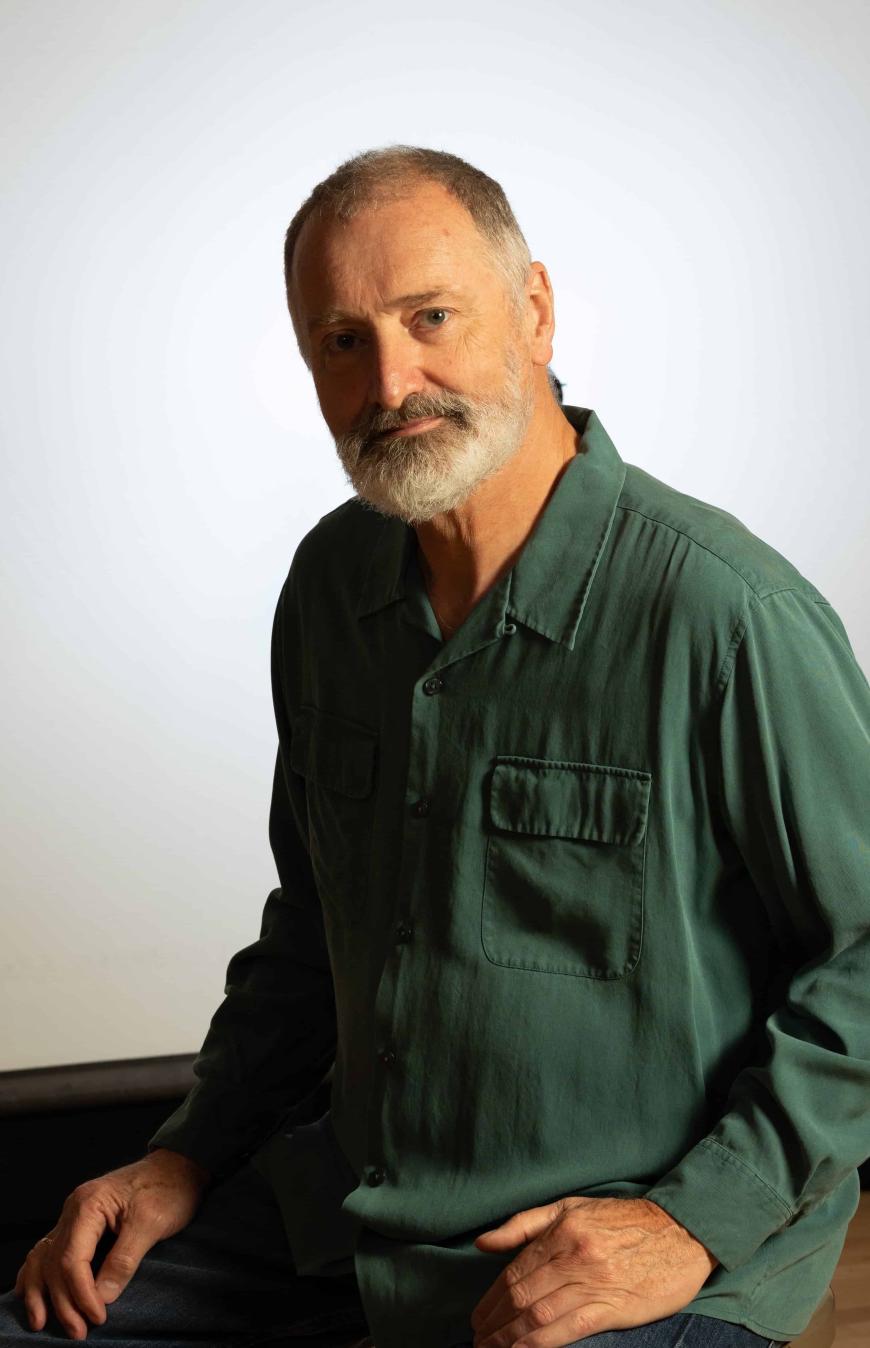
The Quartet moved to San Francisco in 1989, when it became ensemble-in-residence at San Francisco Performances, later adding the title of directors of the Morrison Chamber Music Center
Spring 2025 will mark the Quartet’s retirement from performances, but according to the ensemble’s announcement last week, “After the 2024–2025 season, all members will continue to perform and teach, carrying forward the legacy of the Quartet as an ensemble dedicated to music education.”
Wilson said, “We look forward to our final season, in which we will be revisiting several festive gatherings with some of our favorite and esteemed musical friends.
“We are fortunate to be able to cherish and share so many happy memories, gathered over more than four decades of collaborative music-making.”
The last season will revisit some of the ASQ4’s many associations, including a return to the Ludwig van Beethoven Easter Festival in Poland, as well as final residencies with SF Performances, the Mondavi Center at UC Davis, and St. Lawrence University.
The Quartet currently consists of Wilson, violinists Zakarias Grafilo and Yuna Lee, and violist David Samuel, who succeeded founding violist Paul Yarbrough in 2021. Lee joined the quartet in 2023 in place of Fred Lifsitz, a member for some three decades, while Grafilo has been with the ensemble since 2002.
Musicians and audiences, especially in the Bay Area, were shocked by the announcement. “I’m so sad to hear this news,” said pianist Lydia Artymiw. “I loved working with the Alexander Quartet — we performed the [Dmitri] Shostakovich [Piano] Quintet in San Francisco in 2009. They are such wonderful colleagues and great musicians.”
Composer Jake Heggie told SF Classical Voice:
“I first heard the fabulous Alexander String Quartet when I was a student at UCLA — they gave a luminous concert with soprano Elly Ameling. I can still hear and feel it.
“Imagine my joy when Ruth Felt, SF Performances, and the ASQ4 invited me to create a special work to celebrate [the Quartet’s] 30th anniversary! A full-circle moment. It was the song cycle Camille Claudel: Into the Fire (texts by Gene Scheer) with mezzo-soprano Joyce DiDonato.
“It received its premiere in 2012 and has been performed all over the world by now. It all started with the Alexander String Quartet: What a generous, remarkable, and indelible ensemble it is — iconic and cherished forever.”
James Toland, whose organization supports young singers, responded: “Alexander was the first string quartet I ever heard play live. What a revelation! Made chamber music a passion for me.”
Cellist Nina Flyer wrote: “They’re the real backbone of chamber music in the Bay Area. And their relationship with Robert Greenberg was magic.”
Composer, music historian, and pianist Greenberg says he has known the ASQ4 for decades. “They have been performing my music since 1988, and we have shared the stage and performed programs together continuously since 1992.
“Very simply, personally and professionally, my relationship with the ASQ4 has been the single high point of my musical life. They are a magnificent quartet. But much more, they are — and have always been individually — magnificent people.”
In its history, the ASQ4’s worldwide activities have included its many years hosting the now-dormant Yehudi Menuhin Chamber Music Seminar and Festival at San Francisco State University. Participants over the years included violist Toby Appel, cellist David Requiro, double bassist and composer Shinji Eshima, pianists Sarah Cahill and Laura Dahl, and soprano Christine Brandes.
Mentoring the next generation of chamber musicians and chamber music lovers has long been central to the Quartet. The ensemble’s educational work has won honorary degrees from St. Lawrence University and Allegheny College and presidential medals from Baruch College (CUNY).
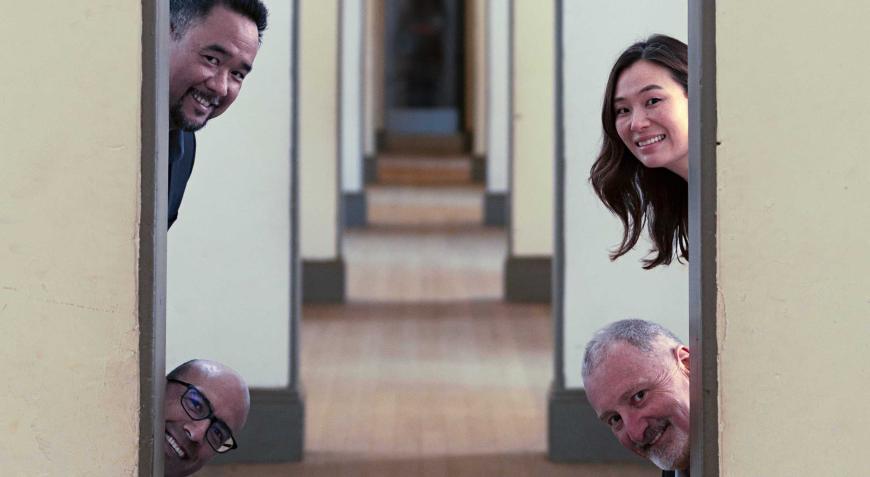
The ASQ4 has served as quartet-in-residence at St. Lawrence University, Allegheny College, Baruch College, and SF State, as well as SF Performances and the Mondavi Center, where the ensemble has presented educational series with Greenberg.
The mentorship legacy of the Quartet includes fostering the Afiara, Del Sol, Hausmann, Sausalito, and Tower Quartets, as well as countless other young musicians who have gone on to careers in chamber music, orchestral performance, and teaching.
“The ASQ4 has had a profound impact on generations of young musicians and ensembles across the U.S. and abroad,” said Alexander violist Samuel, a founding member of the Afiara Quartet. “When we founded the Afiara Quartet in 2006, it was a direct result of the support, mentorship, and opportunities afforded us by the ASQ4, which opened the door for us to enjoy such an artistically and professionally rewarding career.”
The ASQ4 has performed at Lincoln Center, the 92nd Street Y, the Metropolitan Museum of Art, Jordan Hall, and the Library of Congress, as well as embarked on numerous overseas tours, including to the U.K., the Czech Republic, the Netherlands, Italy, Germany, Spain, Portugal, Switzerland, France, Greece, Georgia, Argentina, Panama, and the Philippines. The Quartet’s 2015 visit to Poland’s Ludwig van Beethoven Easter Festival was captured in an award-winning documentary.
Samuel Adams, Elliott Carter, Aaron Copland, George Crumb, Joyce DiDonato, Marc-André Hamelin, Lynn Harrell, Jake Heggie, Branford Marsalis, Midori, Tarik O’Regan, Wayne Peterson, David Sánchez, Richard Stoltzman, Augusta Read Thomas, and Joyce Yang are just some of the many composers, instrumentalists, and singers with whom the ASQ4 has collaborated in performance and recording projects, crossing genres from classical to jazz, rock, and folk.
The Quartet’s most recent collaborative project, British Invasion, brought the ensemble together with guitarist William Kanengiser to explore the music of Sting, Led Zeppelin, John Dowland, and the Beatles by way of contemporary composers Ian Krouse, Dušan Bogdanović, and Leo Brouwer.
The ASQ4 founded and will continue to manage the Foghorn Classics label, on which it has released an extensive recording catalog. The ensemble’s recordings have included the complete string quartet cycles of Beethoven, Brahms, Béla Bartók, Zoltán Kodály, and Dmitri Shostakovich and a series of Mozart’s chamber music, titled Apotheosis, in collaboration with Paul Yarbrough and Joyce Yang.
Other major recordings include the 2020 release of the Mozart and Brahms clarinet quintets (with Eli Eban) and the 2019 release Locale, featuring Antonín Dvořák’s “American” Quartet and Piano Quintet (with Joyce Yang).
The ASQ4’s recording catalog also includes Gustav Mahler’s Lieder eines fahrenden Gesellen, Rückert-Lieder, and Kindertotenlieder song cycles in transcriptions for mezzo-soprano (with Kindra Scharich) and a string quartet by Alexander first violinist Grafilo. The ensemble’s discography has helped to preserve the legacy of a matched set of instruments known as the Ellen M. Egger Quartet, made in San Francisco by the late Francis M. Kuttner.


